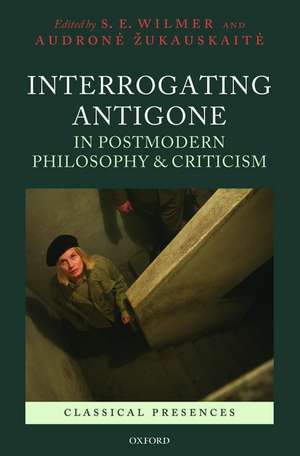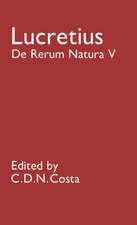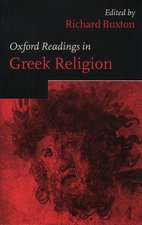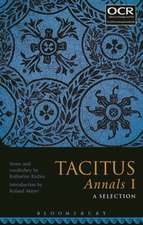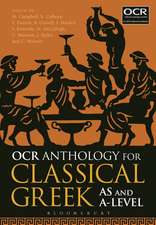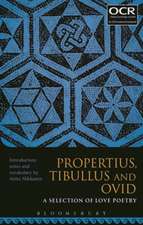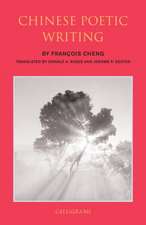Interrogating Antigone in Postmodern Philosophy and Criticism: Classical Presences
Editat de S. E. Wilmer, Audrone Zukauskaiteen Limba Engleză Hardback – 26 aug 2010
Din seria Classical Presences
- 27%
 Preț: 476.23 lei
Preț: 476.23 lei - 30%
 Preț: 493.26 lei
Preț: 493.26 lei - 30%
 Preț: 501.09 lei
Preț: 501.09 lei - 30%
 Preț: 593.43 lei
Preț: 593.43 lei - 6%
 Preț: 337.35 lei
Preț: 337.35 lei - 30%
 Preț: 540.38 lei
Preț: 540.38 lei - 28%
 Preț: 474.92 lei
Preț: 474.92 lei - 17%
 Preț: 501.92 lei
Preț: 501.92 lei - 13%
 Preț: 226.46 lei
Preț: 226.46 lei - 25%
 Preț: 687.80 lei
Preț: 687.80 lei - 19%
 Preț: 677.96 lei
Preț: 677.96 lei - 30%
 Preț: 821.25 lei
Preț: 821.25 lei - 28%
 Preț: 473.71 lei
Preț: 473.71 lei - 26%
 Preț: 614.24 lei
Preț: 614.24 lei - 17%
 Preț: 582.93 lei
Preț: 582.93 lei - 30%
 Preț: 538.77 lei
Preț: 538.77 lei - 30%
 Preț: 645.95 lei
Preț: 645.95 lei - 30%
 Preț: 501.52 lei
Preț: 501.52 lei - 18%
 Preț: 704.79 lei
Preț: 704.79 lei - 27%
 Preț: 519.88 lei
Preț: 519.88 lei - 16%
 Preț: 706.89 lei
Preț: 706.89 lei - 25%
 Preț: 554.32 lei
Preț: 554.32 lei - 16%
 Preț: 584.68 lei
Preț: 584.68 lei - 30%
 Preț: 562.14 lei
Preț: 562.14 lei - 30%
 Preț: 598.80 lei
Preț: 598.80 lei - 30%
 Preț: 617.54 lei
Preț: 617.54 lei - 25%
 Preț: 612.31 lei
Preț: 612.31 lei - 30%
 Preț: 589.73 lei
Preț: 589.73 lei - 30%
 Preț: 789.84 lei
Preț: 789.84 lei - 30%
 Preț: 600.20 lei
Preț: 600.20 lei - 30%
 Preț: 611.82 lei
Preț: 611.82 lei - 29%
 Preț: 1083.87 lei
Preț: 1083.87 lei - 19%
 Preț: 326.97 lei
Preț: 326.97 lei - 26%
 Preț: 760.17 lei
Preț: 760.17 lei - 30%
 Preț: 833.88 lei
Preț: 833.88 lei -
 Preț: 307.88 lei
Preț: 307.88 lei - 28%
 Preț: 446.91 lei
Preț: 446.91 lei - 30%
 Preț: 721.88 lei
Preț: 721.88 lei - 30%
 Preț: 575.88 lei
Preț: 575.88 lei - 30%
 Preț: 598.02 lei
Preț: 598.02 lei - 30%
 Preț: 803.03 lei
Preț: 803.03 lei - 30%
 Preț: 733.67 lei
Preț: 733.67 lei - 30%
 Preț: 701.54 lei
Preț: 701.54 lei - 30%
 Preț: 601.52 lei
Preț: 601.52 lei - 30%
 Preț: 747.48 lei
Preț: 747.48 lei - 30%
 Preț: 556.05 lei
Preț: 556.05 lei - 30%
 Preț: 818.03 lei
Preț: 818.03 lei
Preț: 720.23 lei
Preț vechi: 1031.03 lei
-30% Nou
Puncte Express: 1080
Preț estimativ în valută:
137.81€ • 144.41$ • 113.93£
137.81€ • 144.41$ • 113.93£
Carte tipărită la comandă
Livrare economică 31 martie-07 aprilie
Preluare comenzi: 021 569.72.76
Specificații
ISBN-13: 9780199559213
ISBN-10: 019955921X
Pagini: 444
Ilustrații: 7 in-text illustrations
Dimensiuni: 165 x 241 x 31 mm
Greutate: 0.79 kg
Editura: OUP OXFORD
Colecția OUP Oxford
Seria Classical Presences
Locul publicării:Oxford, United Kingdom
ISBN-10: 019955921X
Pagini: 444
Ilustrații: 7 in-text illustrations
Dimensiuni: 165 x 241 x 31 mm
Greutate: 0.79 kg
Editura: OUP OXFORD
Colecția OUP Oxford
Seria Classical Presences
Locul publicării:Oxford, United Kingdom
Recenzii
The book is comprehensive in its investigations and, as such, will inevitably appeal to scholars from many different disciplines and backgrounds.
the volume presents an excellent example of an interdisciplinary discourse that fuses theoretical and practical concerns, offering useful insights to both scholars and theatre practitioners.
An important contribution to the fields of Classics, drama, and philosophy, this book is very well worth reading, demonstrating as it does the rich heritage and impact of the play in postmodern philosophy and thought.
a series of thought-provoking essays
Interrogating Antigone has the immense merit of probing on a number of different levels the reasons why Antigone the character and Antigone the play continue to haunt us down the ages.
offers a rich economy of semiotic exchanges in the multiple efforts of critics to produce new meanings through their alternative engagements with the classical text and its inexhaustible resources. Readers will find in the book a rich variety of Antigones with which to enter into some kind of meaningful exchange.
the volume presents an excellent example of an interdisciplinary discourse that fuses theoretical and practical concerns, offering useful insights to both scholars and theatre practitioners.
An important contribution to the fields of Classics, drama, and philosophy, this book is very well worth reading, demonstrating as it does the rich heritage and impact of the play in postmodern philosophy and thought.
a series of thought-provoking essays
Interrogating Antigone has the immense merit of probing on a number of different levels the reasons why Antigone the character and Antigone the play continue to haunt us down the ages.
offers a rich economy of semiotic exchanges in the multiple efforts of critics to produce new meanings through their alternative engagements with the classical text and its inexhaustible resources. Readers will find in the book a rich variety of Antigones with which to enter into some kind of meaningful exchange.
